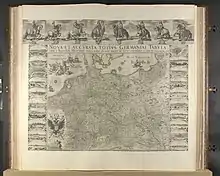Klencke Atlas
The Klencke Atlas, first published in 1660, is one of the world's largest atlases.[1] Originating in The Netherlands, it is 1.75 metres (5 ft 9 in) tall by 1.9 metres (6 ft 3 in) wide when open,[2] and so heavy the British Library needed six people to carry it.[1]

Description
Klencke Atlas is a singular work; no other copies were created. It is a world atlas made up of 41 copperplate wall maps that remain in exceptionally good condition.[3] The maps were intended to be removed and displayed on the wall.[1] The maps are of the continents and assorted European states[4] and it was said to encompass all the geographical knowledge of the time.[5] Dutch Prince John Maurice of Nassau is credited with its creation,[5] and it contains engravings by artists Joan Blaeu and Hondius and others.[4]
It was presented by a consortium of Dutch sugar merchants, represented by Professor Johannes Klencke,[6][7] to King Charles II of England in 1660 to mark the occasion of his Restoration to the throne.[1] The consortium likely hoped to gain favourable trade agreements with Britain for slave trade and their sugar plantations.[3] Johannes Klencke was the son of a Dutch merchant family, and an expert on Hugo Grotius. Charles, a map enthusiast, kept it in the 'Cabinet and Closset of rarities' in Whitehall.[6]
History
In 1828, King George IV gave it to the British Museum as part of a larger gift of maps and atlases, the King's Library, collected by his father George III.[4][8] In the 1950s it was re-bound and restored.[4] Today it is held by the Antiquarian Mapping division of the British Library in London.[1] Since 1998 it was displayed at the entrance lobby of the maps reading room.[6] In April 2010 it was publicly displayed for the first time in 350 years with pages open,[2] at an exhibition at the British Library.[1][9]
Until 2012 the Klencke Atlas was widely regarded as the world's largest atlas,[2] a record it probably held since the atlas was created 350 years earlier.[10] In February 2012, Australian publisher Gordon Cheers published a new atlas called Earth Platinum that is bigger by about a foot making it probably the largest atlas in the world; 31 copies were made priced at US$100,000 each.[11][12]
In 2017, the British Library digitized the atlas and made it available online.[13] A video of the digitization process was also made available.[14]
Notes
- "The World Actually Fits In The World's Largest Book", Liane Hansen, NPR, January 31, 2010
- "Largest book in the world goes on show for the first time", The Guardian, 26 January 2010
- Tom Harper. "The Klencke Atlas". British Museum. Retrieved May 13, 2017.
- "And You Think Your Kids’ Books Are Heavy", Vic Brand, Art Info, January 28, 2010
- ""Largest book in the world" to be displayed for the first time", The Daily Telegraph, 28 January 2010
- Peter Barber. The Map Book, Bloomsbury Publishing USA, 2005. pg. 164
- Dirk van Miert. Humanism in an Age of Science: The Amsterdam Athenaeum in the Golden Age, BRILL, 2009. pg. 68-70
- "King George III Topographical and Maritime collections". British Museum. Retrieved 13 May 2017.
- Magnificent Maps: Power, Propaganda and Art, exhibition at British Library, 30 Apr 2010 - Sun 19 Sep 2010
- No other known atlas made such a claim.
- Alan Smith. "Earth Platinum, the largest world atlas ever produced has been launched in Abu Dhabi". Global Mapping UK. Archived from the original on 5 January 2013.
- "Kiwis leave their mark on world's biggest atlas :: Idealog :: The magazine and website of New Zealand creative business, ideas and innovation". Archived from the original on 2014-07-16. Retrieved 2012-05-21.
- Jason Daley (12 May 2017). "Massive Royal Atlas Gets Digitized". Smithsonian.com. Retrieved 13 May 2017.
- Allison Meier (28 April 2017). "Watch the British Library Digitize One of the World's Largest Books". hyperallergic.com. Retrieved 13 May 2017.
External links
- Klencke Atlas, British Library digitized edition
- (Picture) "Largest book in the world goes on show for the first time", The Guardian, 26 January 2010
- Magnificent Maps: Power, Propaganda and Art, exhibition at British Library, 30 Apr 2010 - Sun 19 Sep 2010